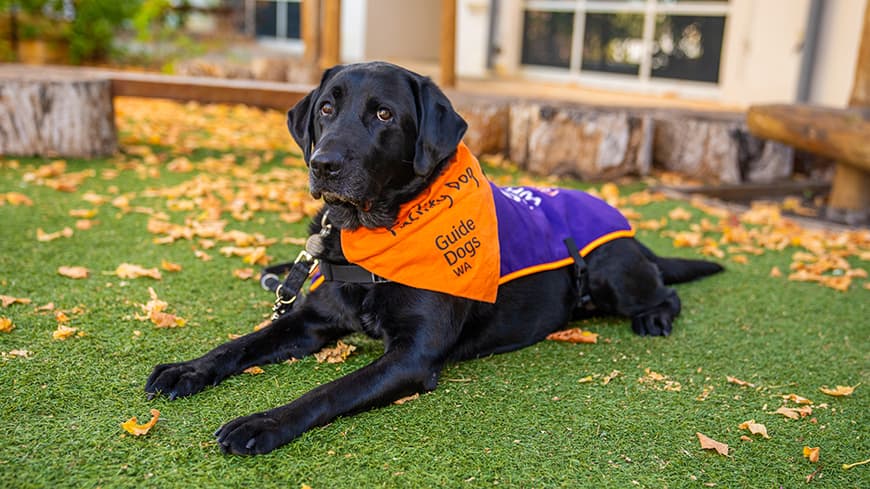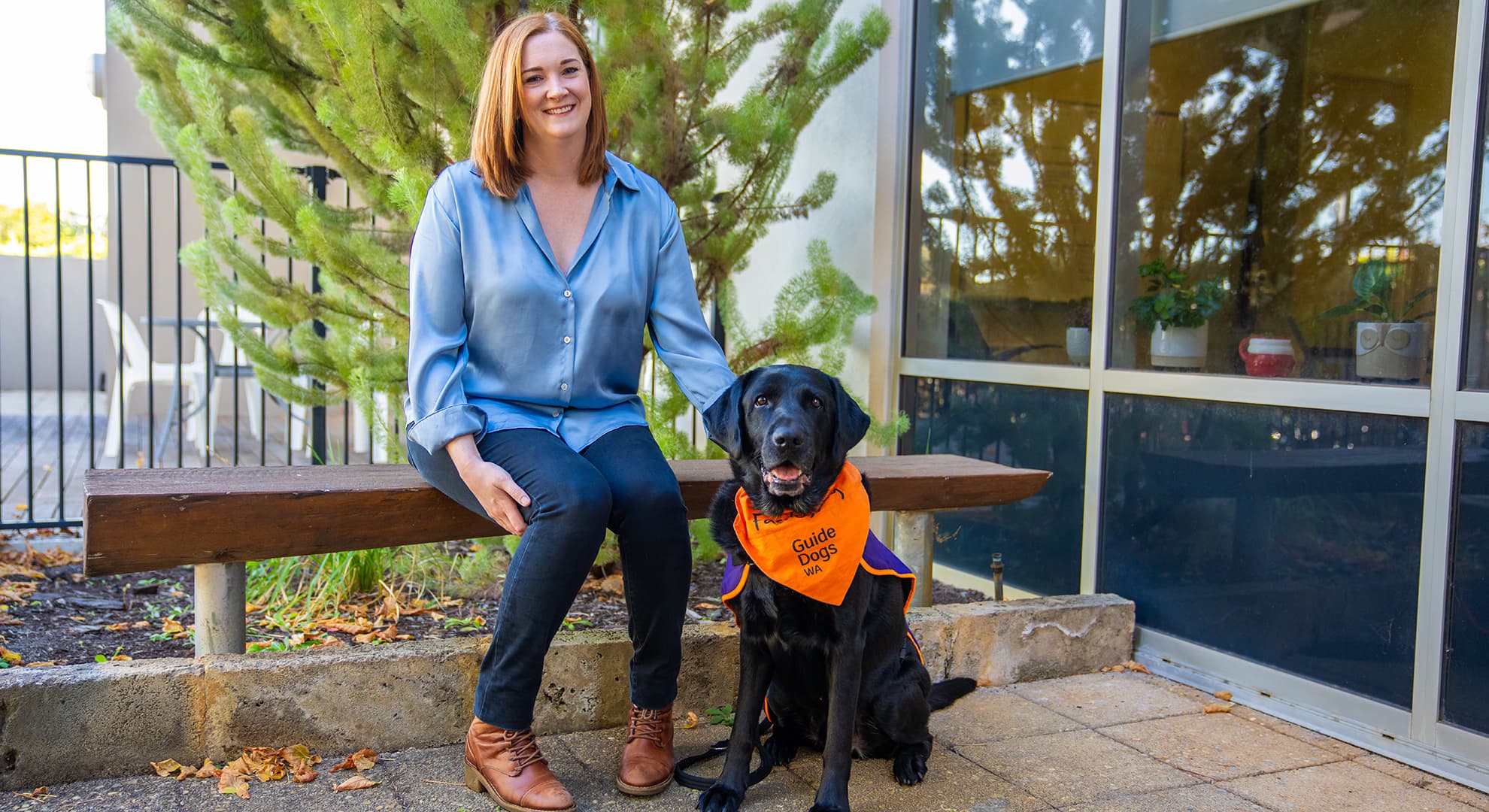A new Edith Cowan University (ECU) study has revealed that having a four-legged friend at Children's Court significantly reduces stress and anxiety for young victims, witnesses, and their caregivers.
ECU criminology researchers Dr Suz Rock and Associate Professor Natalie Gately have published the first Australian study to evaluate the impact of introducing a justice facility dog to a Children’s Court.
The Perth Justice Facility Dog Program is a partnership between the Office of the Commissioner for Victims of Crime and Guide Dogs WA. It aims to support victims of crime, witnesses, and court visitors by hosting a facility dog at the Perth Children's Court.
 Winston, a Justice Facility Dog trained by Guide Dogs WA.
Winston, a Justice Facility Dog trained by Guide Dogs WA.
Winston, a Black Labrador Retriever, was specifically selected and trained by Guide Dogs WA to attend the Perth Children's Court building two to four times a week with his handler.
People could pat, sit with, and talk to Winston. He could also lie on the ground beside people or place his head or paws on their feet, providing a comforting body pressure.
Dr Rock said there can be a perception that children in court are all young people who have offended.
"However, children are also in courts because they have been victims of, and/or witnesses to criminal events," she said.
"Most have already been traumatised in some way and making them relive, recall, remember and talk about it in court can be re-traumatising, so having a way of reducing the trauma is imperative for children.
"Without their testimony offenders can go unpunished as they can’t be convicted."
Facility dog significantly reduced stress and anxiety
Dr Rock said court environments can be very stressful, induce anxiety and have lasting impacts for children.
"For child abuse victims in particular the long-term effects of testifying in court are greater for those who had a negative reaction to testifying. They are more likely to have poor adjustment, and negative views of the court system in adulthood," she said.
Children and caregivers were surveyed to determine the effect of interacting with Winston on their self-reported anxiety and stress levels in the court. They reported their stress levels before and after interaction.
Dr Rock said all the children in the study showed a significant reduction in both stress and anxiety when having access to Winston at court, and there were also other benefits.
"Parents and caregivers also reported a reduction of stress and anxiety," she said.
"And court staff who are also dealing with stressful stories, anxious clients, and exposed to various kinds of trauma reported that Winston reduced their stress levels and provided a more positive working environment."
In their own words
Children described how Winston helped them in court and reduced negative feelings:
- "He helps with getting stuff off your mind."
- "Winston is a very good service dog, and he calmed me down and helped me."
- "He really helps you get not stressed."
- "Winston is a sick dude and a good mate when I have to come here."
- "He made me feel comforted and helped a lot with the nerves."
One caregiver summarised the consensus well in her experience with Winston and his handler:
My daughter was so nervous to come today but when she heard about Winston, she got excited. He has been the best company for all of us. Having him here has changed the whole atmosphere of the wait. He is so gentle and lovely and the Guide Dogs lady has been so fab too. You have to keep this running! We love Winston!
Dr Rock said despite the positive findings of court users, it was also important to examine whether the program impacted the running of the Children’s Court.
"There was no reported negative impact on the functioning of the Children’s Court from the perspectives of the court staff," she said.
"Workers reported that Winston calmed the environment in the court," she said.
 Guide Dogs WA Justice Facility Dog Handler Katie Crawford with Winston.
Guide Dogs WA Justice Facility Dog Handler Katie Crawford with Winston.
A remarkable impact in a high-stress environment
Guide Dogs WA CEO Anna Presser said ECU's positive research provides confirmation of the profound difference specialist dogs make.
"We've witnessed firsthand the remarkable impact of our facility dogs in high-stress environments such as children's court. This evidence is crucial as we aim to expand the presence of facility dogs into more courts across the state, aiding more vulnerable individuals," she explained.
"Our local breeding program, established in 2022, ensures our dogs are trained here in Western Australia from puppies. Our experienced trainers identify where they'll best serve our community—whether it's guiding, assisting individuals with Autism, providing therapy, or serving as facility dogs, or within our breeding program.
"Collaborating with the Office of the Commissioner for Victims of Crime, it's been rewarding for us all to see the confirmed evidence of how the innate calmness and gentle temperament of our facility dogs support children in the Perth Children's Court, substantially reducing their stress and anxiety, enhancing speech and memory function, and promoting overall physical and mental well-being in what we all know is a challenging environment, especially for children."
Making news in parliament
News of the ECU evaluation of the Perth Justice Facility Dog Program recently made its way to WA Parliament.
In a recent 2024-2025 Budget Estimates Committee Meeting Commissioner for the Victims of Crime Kati Kraszlan reported on the ECU findings, confirming children taking part in the pilot program reported less stress and anxiety when having access to Winston at court.
"Also, there were no incidences in the court on the days that Winston was in the court," she said.
"It did not cause any problems in the operation of the court and, in fact, Winston was responsible for reducing the number of disturbances.
"Winston is now completing his second career and transitioning to retirement. The program has been able to remain stable with the new facility dog training."
The study 'Kids, Courts and Canines: Evaluating the Justice Facility Dog Program through a Therapeutic Lens in Perth Children's Court' is published in the Journal of Criminology.

 ECU Criminology Researcher Dr Suz Rock with Winston, a Justice Facility Dog trained by Guide Dogs WA.
ECU Criminology Researcher Dr Suz Rock with Winston, a Justice Facility Dog trained by Guide Dogs WA.




